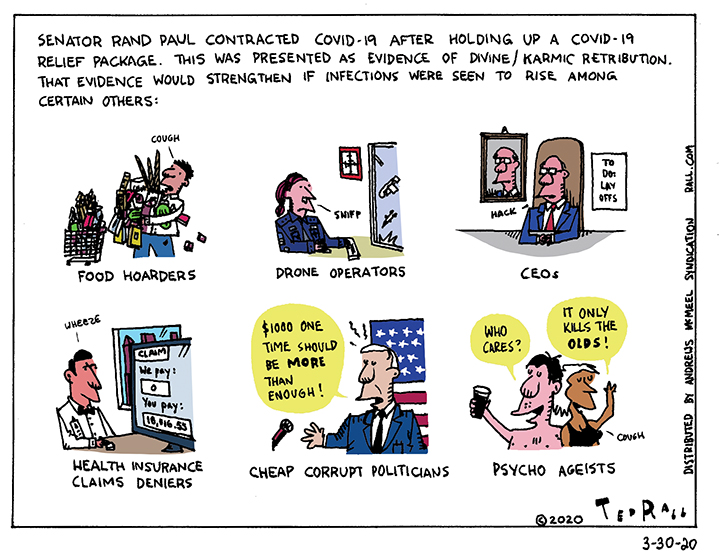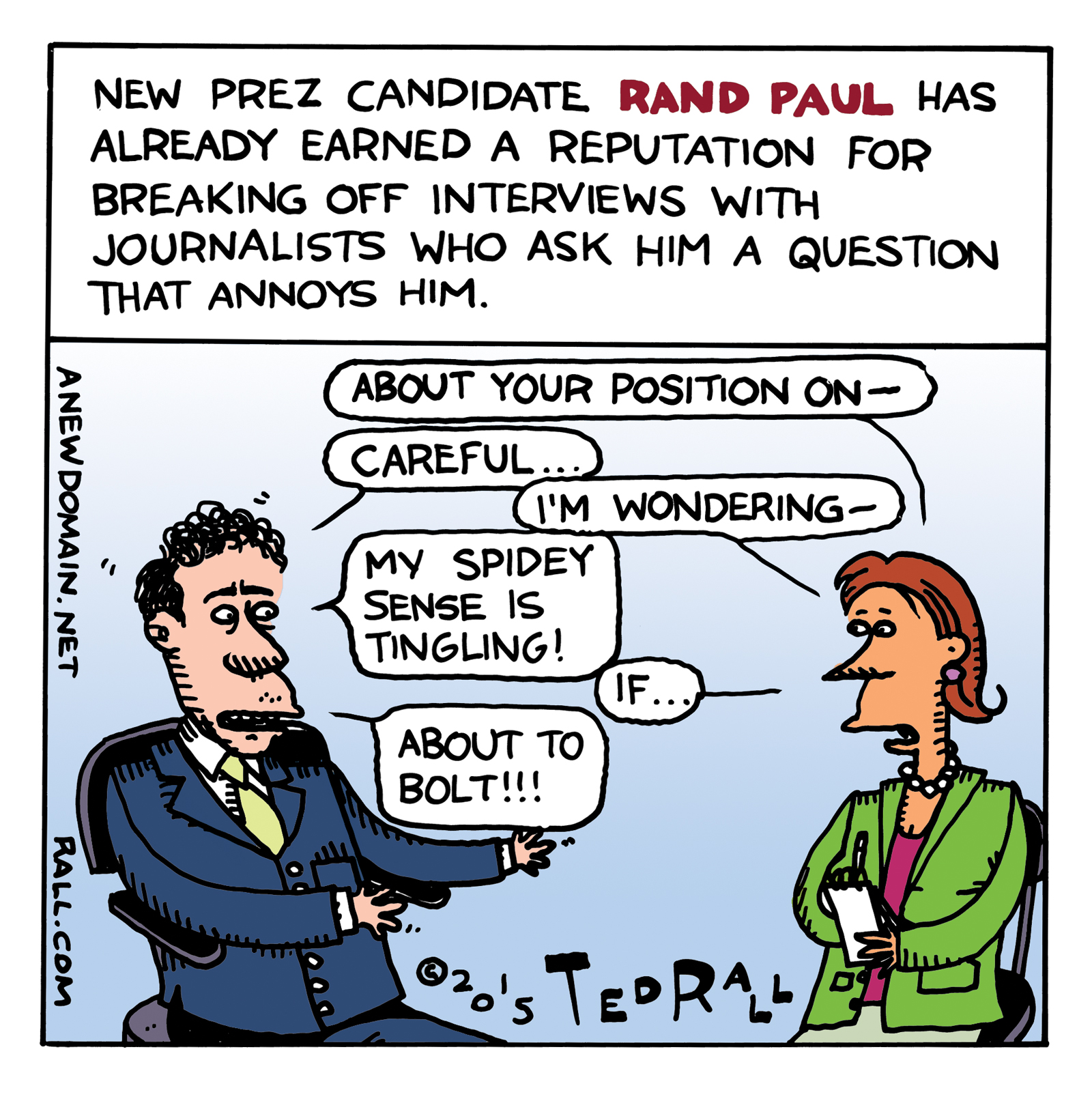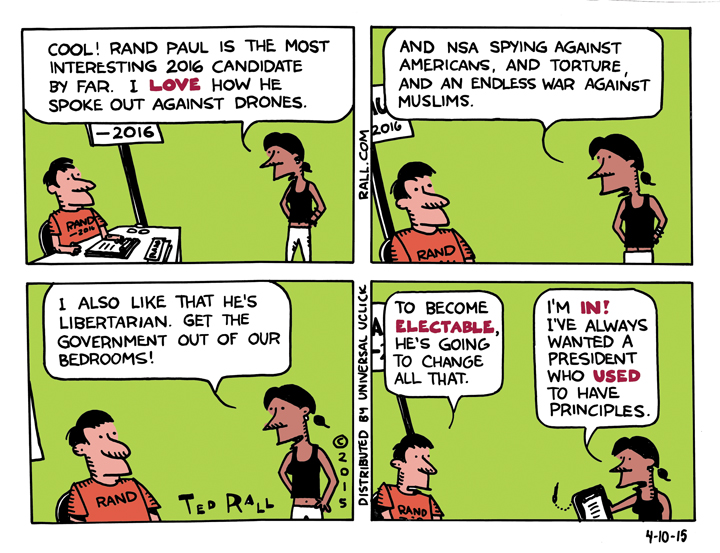
On top of the $2 billion it already sent to Ukraine, the Joe Biden Administration has asked Congress to ignore its previous request for a $10 billion to pay for updated COVID-19 vaccines for American citizens (pandemic? what pandemic?) and send an additional $33 billion to Ukraine instead. The House of Representatives not only obliged, but authorized more than Biden wanted, $40 billion.
The U.S. Congress does this with military spending all the time. They live to please!
Every Democratic congressman voted “yes” to send weapons to a country that has “several hundred monuments, statues, and streets named after Nazi collaborators,” according to The Forward. That even includes AOC’s “Squad,” who claimed to be progressive.
In the Senate, a rare voice of opposition was raised by libertarian Republican Rand Paul. “We don’t need to be the sugar daddy and the policemen of the world,” Paul remarked. For his trouble, Paul was bizarrely accused of “treason” by online commenters who suggested that his surly Kentucky neighbor should assault him again. All Paul wanted was a week to go over exactly where all that money is going.
Whatever you think of the crisis in Ukraine, Paul has a point. A week isn’t going to make any difference. We should distrust bullies who tell us there’s no time to think, hurry up, shut up, do what we tell you. The total lack of debate in Washington, and in the news media, over the quick transfer of $40 billion to a country that is not a U.S. ally, has a grim human rights record and recently banned a bunch of political parties and opposition cable news channels, ought to prompt some sort of discussion. First and foremost, we ought to consider just how much money $40 billion is and what it could do here in the United States, for Americans.
The $40 billion we are sending to Ukraine will not change the outcome of the war. The United States would never commit enough money or ground troops to do that because it would risk World War III with Russia. The $40 billion will buy a lot of weapons and ammunition that will kill Russians and Ukrainians—nothing more, nothing less.
So how much, exactly, is $40 billion?
Here in the United States, here are some of the things that $40 billion could do:
A $2,000 scholarship for every college student.
A $6,000 scholarship for every college student who is officially in poverty.
$72,000 to every homeless person.
$2,400 to every veteran.
$410,000 to every public school.
$1.3 million to every public high school. It could be used to buy books and other equipment, fix broken infrastructure, build something new for the kids. $1.3 million would pay the salaries of 20 new teachers for 10 years.
$500 to each American family. I pledge to use my $500 not to kill any Russians or Ukrainians.
$420 to every cat. That’s a lot of kibble and litter. Cats don’t kill Russians or Ukrainians.
$2 million each to every person wrongfully convicted of a murder they didn’t commit.
Give a new, fully-loaded car to a million people.
Give a sweet, fully-loaded Macbook Pro laptop to 10 million people.
Give a sweet new TV to 100 million people.
Everyone who currently subscribes to Netflix gets three years for free.
Every adult gets a free subscription to the Washington Post digital edition for three years.
Every adult gets 15 free tickets to the actual, real, in-person, not-at-home movies.
$40 billion would repair almost all of the 220,000 bridges in the United States that need to be repaired and replace all of the 79,500 that need to be replaced. Add the $2 billion we already sent to Ukraine and you can delete the word “almost.”
$40 billion would buy Twitter.
$86,000 for everyone raped over the last year.
$7,000 to help the caregivers of everyone suffering from dementia.
It would hire 50,000 journalists for 20 years. There are only 6,500 now.
$4,000 to every self-identified Native American and Alaska Native. It’s not nearly enough considering what has been done to them, but it’s better than the current nothing.
What if, for some strange reason, we don’t want to use that $40 billion to help our own people right here at home, one out of nine of whom is officially poor—some of whom are actually starving? While the inclination to shovel money at other countries while so many of our own citizens are suffering is nearly impossible to understand, some people (the President, several hundred members of Congress) have such a mindset and therefore must be addressed.
If we’re looking for a country in dire need of, and richly deserving of, $40 billion, we need look no further than Afghanistan.
Afghanistan, which the U.S. brutally occupied for 20 years after invading without just cause, is suffering from the biggest humanitarian crisis in the world. Half its population—20 million people—is suffering from “acute hunger,” according to the UN. The nation collapsed because the U.S. pulled the plug on the economy when it withdrew, imposed draconian economic sanctions in a fit of spiteful pique and seized $7 billion in Afghanistan government funds. Biden has promised a little aid, though none has shown up in Kabul.
From the Intercept: “A senior Democratic foreign policy aide, who was granted anonymity to openly share his thoughts on the Biden administration’s actions, said the policy ‘effectively amounts to mass murder.’ According to the aide, Biden ‘has had warnings from the UN Secretary General, the International Rescue Committee, and the Red Cross, with a unanimous consensus that the liquidity of the central bank is of paramount importance, and no amount of aid can compensate for the destruction of Afghanistan’s financial system and the whole macro economy.’”
Democrats recently joined Republicans to vote no on a modest proposal to study the effect of U.S. sanctions against the Afghan people.
Then again, we really do need that COVID money.
(Ted Rall (Twitter: @tedrall), the political cartoonist, columnist and graphic novelist, is the author of a new graphic novel about a journalist gone bad, “The Stringer.” Order one today. You can support Ted’s hard-hitting political cartoons and columns and see his work first by sponsoring his work on Patreon.)






 Clinton is too far to the right and have never forgiven her for her positions on free trade agreements and voting in favor of the invasion of Iraq in 2003 keeps saying they want Massachusetts senator and consumer advocate Elizabeth Warren. Pictured at left, she would be challenging the former first lady from the Left. But Warren has repeatedly said she isn’t running, her fans don’t have much money, and her actions – well, more like her inaction in not showing up in key primary states like Iowa – support her
Clinton is too far to the right and have never forgiven her for her positions on free trade agreements and voting in favor of the invasion of Iraq in 2003 keeps saying they want Massachusetts senator and consumer advocate Elizabeth Warren. Pictured at left, she would be challenging the former first lady from the Left. But Warren has repeatedly said she isn’t running, her fans don’t have much money, and her actions – well, more like her inaction in not showing up in key primary states like Iowa – support her 




 Finally, there’s two other governors, both from the Midwest: John Kasich of Ohio and Scott Walker of Wisconsin.
Finally, there’s two other governors, both from the Midwest: John Kasich of Ohio and Scott Walker of Wisconsin.

